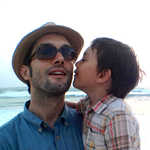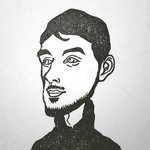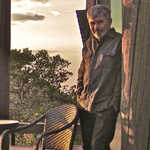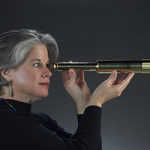It usually ends here: A blinking blue cursor, a thumb hovering over a button marked Send, rumpled sheets in the metallic morning light. A message you’ve sent countless times: “I’m feeling kinda out of it. Just going to stay in today.”
You met J. at a conference three days before. There’s a hot springs—he’d said—a couple hours outside of Portland, that some friends had recommended. The words “hot springs” are mnemonic catnip. You remember Kyoto: the slow ride up Mount Kurama on a single-carriage train, a scene out of a Miyazaki movie. You remember Taiwan, with your dad: pungent sulfur and learning that the emoji you thought was a steaming pancake is the international symbol for hot springs. You remember Truth or Consequences, New Mexico: staring at the hills across the Rio Grande, conversing with an enchanting old hispanic woman visiting with her sister. “Such a long name,” she’d said, “for such a little town.”
Maybe it’s these memories that keep you from hitting Send. Or maybe you know that if you stay in, you won’t feel any better. You world will feel fixed in size, tiny, will spin with the same fears and concerns in the gravity of this unfamiliar bed. You want the world to feel big again. So you erase erase erase and hit Send on a different message, one that says, “Hot springs today?”
J. writes back: “good morning brother. let’s do it!” And it begins.
You coordinate with J., get the address for the house where he’s staying and find the closest rental car office. You text D., whom you met the day before. You and J. had mentioned a hot springs jaunt to her in the plotting and scheming characteristic of rainy nights and too much bourbon. You expect the I’m Staying In message from her, the one you yourself were about to send, but instead D. writes, “Could leave my hotel at 10.30.”
You dress, pack, check out, get tea at the cafe downstairs from your hotel. Your flight to New York leaves in ten hours. You walk a few blocks to the Enterprise and ask them for a car. “We have a Chevy that needs a little cleaning, or a Hyundai that’s ready to go,” the clerk says. You take the Hyundai.
You drive to J.’s but get the street address wrong, read two thousand instead of three. You really get there and J.’s on a call with his bosses. “There will be no cell service at the hot springs,” he tells them. J.’s booked two nights’ stay for himself at the retreat—some friends in California are going to pick him up on their way back up to British Columbia, where he recently bought a house with his girlfriend. J. finishes with his bosses and resumes a game of phone tag with the hot springs, trying to get them to accommodate an extra day guest, D. You help him carry his bags to the car. You drive downtown to pick up D.
J. says to you, and also says to D., when you get to her hotel, “I forgot to mention that this is a clothing-optional hot springs.”
You and D. both pause. You both say, “Sure.”
J. gets a message from the woman who runs the retreat. They’re filled to capacity, she says. You decide to drive there anyway. J. leaves a message for the woman, tells her he’s willing to give up his own day spot if possible. You’ll figure it out when you get there.
You take I-5 to the 22 and the three of you talk about work and travel and home, which for D. is the UK. J.’s navigating from a screenshot of a map on his iPad. The hot springs are in a town called Detroit, and D. says she had no idea Detroit was so close. It’s the other Detroit, you say, a different Detroit. You talk about your Detroit, about the emptiness and the downtown streets five lanes wide and how you never really went there except for sporting events when you were living in the suburbs as a kid. You’d like to spend more time there, you say.
You drive toward green mountains draped with fog. These are the Cascades. You compare it to driving in the Southwest. Driving in the Southwest makes you feel big and connected, is full of light. But here the firs and hemlock along the road are sudden and jarring, and driving makes you feel small, secluded, is full of shadow. The three of you share memories of close calls and unnecessary danger: Going over a hill on a frontage road at a hundred miles an hour. Coming face to face with a grizzly bear bathing in a stream. Getting thrown off a jet ski into the open water. Jumping off a booze cruise boat at night on a dare. The road curves and trees on high grow with surreal uniformity, hiding yet suggesting the underlying contours of dirt and rock. Here in Oregon, even the mountains have beards.
You pass a lake, a dam, a wide river with black tree stumps spotted along the shore. J. reads the directions off his screen: Drive over the bridge, then make a left at the only gas station in Detroit.
You turn at the gas station and go a few miles into the forest when J. has to respond to an email from work. There’s no signal. You stop along the side of the road and he gets out and walks around, waving his phone. Still no signal. You drive back to the gas station and J. calls his office to put out what sounds like a minor tech support fire, akin to getting a call from your parents saying the desktop icon for the internet disappeared and now they can’t get online. D. buys a freshly baked cookie from the gas station. You walk around and take pictures.
J. finishes his call. You have a bite of D.’s cookie, which is doughy and warm and has pieces of dried fruit. You get in the car and drive the remaining miles to the retreat. You check in at the office, and J. cajoles a day pass for D. using poor reception as an excuse. The woman at the desk says, “Well, since you came all this way and we couldn’t get ahold of you …”
You walk to the lodge for lunch, past a sign by a trailhead that says, “The Inner Path.” A sign underneath says, “May be slippery when wet or frosty.”
You walk in the light drizzle past some white canopy tents. A mound of wild mushrooms lays drying on a table. In the lodge there are a couple dozen people and a buffet-style vegetarian ordeal, and the three of you sit on the outside deck and drink hot tea and eat pasta with sweet marinara sauce and crunchy vegetarian stuffing. It reminds you of an ashram you’ve stayed at, a couple hours outside New York.
“I told someone yesterday I was coming here,” J. says, “And they said, You know people just go there to have sex, right?”
“And I thought, where don’t people go to have sex?”
You go to the gift shop and flip through books on meditation, chime the wind chimes hanging from the ceiling. The clerk shows J. where everything is on the map. You rent towels. You drop some things off in the car and follow a path to a ring of stone hot tubs built under a wooden canopy, each tub accommodating four or five people and progressing from warm to hot, with a metal tub filled with ice-cold water a skip away from the hottest. There are a handful older women soaking and lounging about, silver hair and ease, their plump nude bodies like ripe tomatoes. J. takes off his clothes and hangs them over a wooden railing and gets in the water. You have swim trunks in your jacket pocket but they seem silly now, and you strip and do the same. D. takes off her coat and tights and undresses down to a black skirt-top and sits with just her legs in the water, which she’ll later attribute to coming from a more conservative culture. The three of you look at each other and you all think the same thing: Days ago we were strangers.
You tilt your head back and stare at the woodwork of the canopy. You listen to the trees. You hear D. say, “Oh fuck it!” and then you hear a splash. You look over and see her in the water, her dress soaking wet. Behind you the older women laugh and shriek with glee.
You rotate into warmer tubs. You overhear that there’s a contact dance troop saying at the retreat. There are fifty of them and they’re giving a performance that evening. You overhear that someone went out for a hike in the morning and still hasn’t come back, and they sent people out looking for them. You get in the cold water tub and stay there for fifteen, twenty seconds, gasping for breath. Your sinuses clear.
In the hottest tub you have a conversation with a woman wearing a military cap. She works in advertising. You and D. did, too. The woman works on the client side for a technology brand, and you tell her about the arts and technology festival you were attending in Portland. She asks you if you’ve seen the campaign her company did with a well-known arts and culture magazine. She’s visibly disappointed when you say you haven’t. You talk about advertising life, office life, working from home. She’s worked from home for years, she says. A lot of others at the office, too. But she just started going in regularly again because her company wants to attract young employees by having a fun, energetic culture. The woman shakes her head. You wonder out loud why this notion of a fun, energetic culture exists in the first place. Is it just a holdover from past generations? A lame salve to the ten-hour workday? Doesn’t it really just worsen the drudgery, the fatigue? “When you’re in a place with the same people for that much time,” the woman says, “you start carrying all their personal lives with you. It’s exhausting.”
You check the time. You drink plenty of water. You laze and talk about favorite books and final thoughts about the weekend. You dry off and dress and walk back to the lodge. You feel so stable on your feet, you tell J., so firmly planted. “Like the trees,” he says.
Yes, like the trees.
You walk back to the car. You see wild mushrooms growing and D. asks if they’re those kind of mushrooms, and how you can tell. It’s one of J.’s favorite subjects. “I find the theory very attractive,” he says, “that ages ago there were monkeys roaming the earth, and some of the monkeys ate the mushrooms and some didn’t, and the ones that did became us.”
You’re not clear when your flight is leaving and you don’t care enough to look. J. gets his bags out of the car. You and D. hug him goodbye and head for Portland.
You make a wrong turn somewhere and have to drive back to the retreat to ask for directions. You lose forty minutes in the process. You feel the tree-feeling start to slip away.
You drive through wipers-on-full rain, stop at a gas station to fill up. You eat dark chocolate to quell your appetite. You and D. talk about open roads and old jobs and relationships and ruts and meeting new people as the night falls and you see Portland’s lights and bridges in the beyond. You’ll wonder, later, when you’re back in New York, if the difference between loneliness and solitude is just the bed you wake in, and the size of your world.
You drop D. at her hotel and return the car to the rental lot. You inspect the car before you go and find J.’s iPad, make a mental note to get his address in British Columbia to send it back to him. You drop the keys in a box outside the rental office. You hail a cab, a minivan. The driver lives twenty minutes outside Portland and is a musician in his spare time. On nights when he’s playing a gig, he drives his cab into the city and stashes his gear at a friend’s place and works until the show starts. You talk about Portland, about condos going up along the river. You talk about New York, about condos going up along the river. You talk about Detroit, the one you just visited, but also the other Detroit, your Detroit. You’d like to spend more time there, you say.
You get to the airport forty-five minutes before your flight.
You check in.
The woman at the ticketing desk says, “You’re really cutting it close.”
Yeah, well—
Filed Under
Other moments in Detroit
-
Travel, birthday, friendship
It was the day before my 29th birthday. Last minute I decided to go to Detroit.
in Detroit, United States -
Enjoy the Ride, Detroitcity, life moment
When you are in the perfection of the moment nothing has to make sense nothing really matters.
in Detroit, United States -
1aday2014, Travel
Day 31: We're not in summer any more
in Detroit, United States -
I'm going to miss this office. Growth is good, right?
in Detroit, United States -
china, Homesick, Travel
I've been 'home' for three months now, but it still doesn't feel like home. I can't wait to go back.
in Detroit, United States -
running, accidents, Hope
The day I fell while running was full of blue sky and sunshine.
in Detroit, United States






















